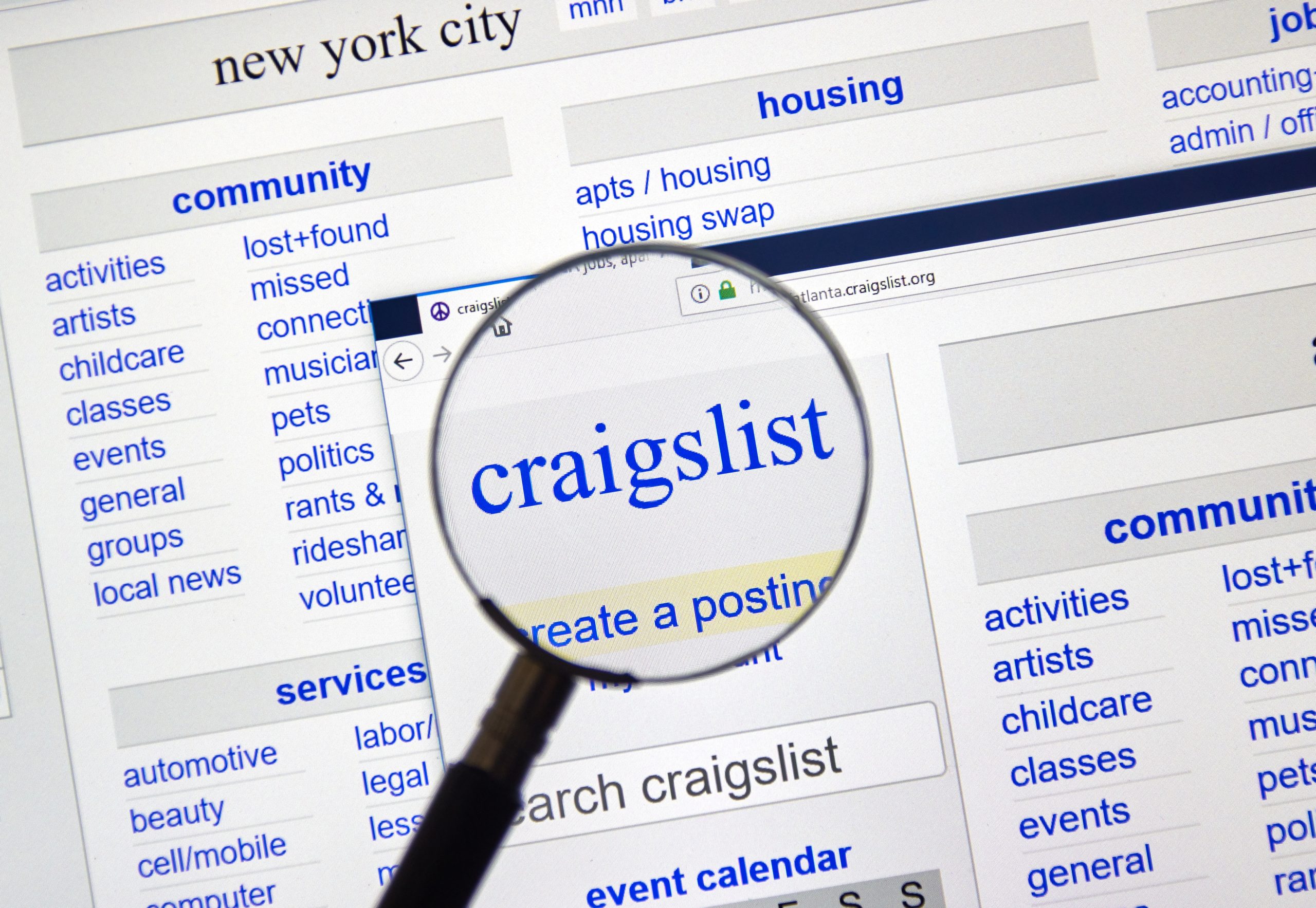Craigslist is an incredibly popular website, used by millions of people each day to buy and sell goods, search for jobs, and more. However, many people don’t realize the legal dangers they may be exposing themselves to when using Craigslist. In this blog post, we’ll look at some of the ways Craigslist can put users in legal peril, and what steps you can take to protect yourself.
Posting personal information
When posting to Craigslist, it is important to be aware of the legal implications associated with revealing too much personal information. Craigslist can be a useful tool for finding jobs and housing, but it is important to remember that anything posted on the website can be seen by anyone who visits the site. As such, it is best to use caution when deciding what to post, as well as how much personal information to share.
The law regarding posting personal information is often unclear. Generally speaking, it is legal to post certain types of information such as name, address, and phone number. However, it is illegal to post information that could put an individual in danger such as social security numbers or bank account numbers. Additionally, it is illegal to post private details about another person without their permission.
It is important to note that even if it is legal to post certain information, doing so can still carry legal risks. If a potential employer or landlord searches the internet and finds a post containing someone’s personal information, they might discriminate against them or deny them an opportunity. Thus, it is important to consider the potential legal ramifications of posting personal information before doing so.
Posting false or misleading information
Posting false or misleading information on Craigslist can have serious legal consequences. If a poster misrepresents or lies about the product or service they are offering, it could be considered fraud. For example, if a poster advertises an item as being in “excellent condition” when it is not, they could be liable for breach of contract.
In addition to civil liability, a poster may also face criminal charges if they post false or misleading information on Craigslist. Depending on the nature of the misrepresentation, the poster could face charges such as fraud or misrepresentation. If a person posts false information about someone else, such as their home address or phone number, they could also be charged with identity theft.
In some cases, a poster may not even realize that the information they are posting is false or misleading. Unfortunately, ignorance of the law does not excuse them from potential liability. It is important for everyone who posts on Craigslist to make sure that their postings are accurate and truthful. If there is any doubt about the accuracy of a post, it is best to refrain from posting it.
Posting copyrighted material
Posting copyrighted material on Craigslist can be a very dangerous legal move. Whether it is posting a video, music, photographs or text, if the material is owned by someone else, it is illegal to post it on Craigslist without their permission. Even if the material is posted as an example, that still constitutes infringement of the copyright. If a copyright owner discovers that their work has been posted without their permission, they may sue for damages, including court costs and attorney fees.
The safest course of action when posting to Craigslist is to make sure that any material you post has either been created by you, or you have received permission from the copyright holder to use it. It is also important to note that although many copyrighted works are in the public domain, some are not. To be sure, it is best to check the copyright status of any material before posting it on Craigslist.
Posting defamatory statements
Posting defamatory statements on Craigslist can be a very costly mistake, both financially and legally. Posting false or derogatory statements about another person, company, or product on Craigslist can lead to civil liability for libel or slander.
Libel is a false statement written, printed, or otherwise published that damages a person’s reputation. Slander is a false spoken statement that damages a person’s reputation. In order to be liable for libel or slander, the statement must be false, hurt the reputation of the person, and be communicated to at least one other person.
In some cases, it may not even be necessary to prove that harm was done in order to be held liable for libel or slander. This is known as libel per se. A statement is considered libel per se if it charges someone with a crime, accuses them of having an infectious disease, alleges that they are unable to perform their profession or trade, or imputes certain characteristics to someone such as lack of integrity or morality.
It’s important to note that even if you don’t directly name the person or entity you are talking about, if enough details are given, you can still be held liable for libel or slander. Additionally, it doesn’t matter if the statement is true or not; you can still be liable even if the statement is true.
So before you post anything on Craigslist, take a minute to consider if what you’re saying might be defamatory. If so, it’s best to leave it off your post. The potential legal ramifications just aren’t worth it.
Posting trade secrets
Posting trade secrets or confidential business information on Craigslist is a major legal risk. Trade secrets are considered to be any information that gives a business an advantage over its competitors and can include customer lists, recipes, software codes, manufacturing processes, and more. Even if the information does not have the “secret” label attached to it, if it has value to the company, it may be protected.
Posting trade secrets on Craigslist can lead to legal action from the company claiming the information as its own. Under the Defend Trade Secrets Act of 2016, a company can pursue legal action against someone who discloses their trade secrets. The courts could impose both civil and criminal penalties for disclosing trade secrets.
If you’re posting something on Craigslist that could be considered a trade secret, take caution. Check with the company first to make sure that the information is not confidential or prohibited from being shared. Otherwise, you may be facing hefty legal consequences.
Posting obscene or lewd material
Posting obscene or lewd material on Craigslist is a serious legal issue. Posting this kind of material could put you at risk of facing criminal charges or civil liability. It is illegal to post any kind of material that is considered “obscene,” which includes things like pornography, profanity, and explicit sexual content. Additionally, some states have laws that make it illegal to post certain types of material, such as materials that are considered “lewd.”
It is important to remember that even if you post something on Craigslist anonymously, law enforcement may still be able to trace the content back to you. Furthermore, if your post contains obscene or lewd material, there is always a chance that someone will report you to the authorities, even if you did not intend for the material to be seen by others.
If you are found guilty of posting obscene or lewd material on Craigslist, you could face serious penalties. In some states, you may be sentenced to jail time and/or fines. Additionally, if a third party were to take legal action against you for posting the material, they could seek compensation for damages, including any emotional distress or reputational harm they suffered as a result.
It is essential to be aware of the laws in your state and understand the potential legal consequences of posting obscene or lewd material on Craigslist. If you are unsure of what constitutes as illegal content, it is best to err on the side of caution and refrain from posting anything that may be considered obscene or lewd in nature.
Posting spam
Spam is defined as unsolicited and unwanted messages or postings sent over the internet. This includes emails, advertisements, website comments, and blog posts. Posting spam on Craigslist can result in serious legal consequences. Not only does it violate the Terms of Use for Craigslist, but it also constitutes a violation of the federal CAN-SPAM Act.
Under the CAN-SPAM Act, individuals who post spam on Craigslist can be held liable for damages and fines. The Act states that spammers must include certain disclosures in their emails, including an “opt-out” feature to allow recipients to stop receiving messages. Additionally, any material deemed “obscene” or “lewd” is strictly prohibited under the CAN-SPAM Act.
The penalties for violating the CAN-SPAM Act can be severe and include financial damages, forfeiture of property, and even jail time. It’s important to understand the potential consequences before posting anything on Craigslist. To avoid potential legal issues, always make sure to read the Terms of Use and follow the rules set forth by Craigslist.
Read More:
→ BLOG: You received your Closing Disclosure, Now What?
→ BLOG: Quitclaim Deeds in Tennessee – Everything you need to Know

